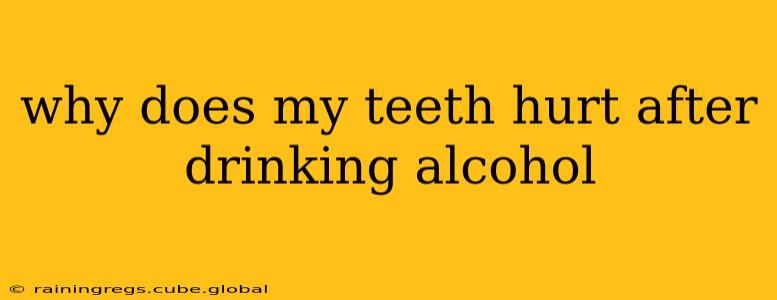Why Does My Teeth Hurt After Drinking Alcohol?
Many people experience tooth sensitivity after consuming alcohol, and it's a surprisingly common question. The pain isn't necessarily directly caused by the alcohol itself, but rather by several factors alcohol consumption can trigger or exacerbate. Let's delve into the potential reasons behind this uncomfortable experience.
What Kind of Alcohol Causes Tooth Pain?
The type of alcohol doesn't seem to be the primary factor. While some alcoholic beverages, like those high in sugar or acid (e.g., sugary cocktails, red wine), might contribute more significantly, even "cleaner" alcohols like vodka or tequila can still lead to tooth sensitivity for some individuals. The key lies in understanding the underlying mechanisms at play.
Is it Acid Reflux?
Yes, acid reflux is a major culprit. Alcohol is known to relax the lower esophageal sphincter (LES), the muscle that prevents stomach acid from flowing back up into the esophagus. This reflux can lead to increased acid exposure in the mouth, irritating sensitive teeth and causing pain. The acidic nature of some alcoholic drinks themselves further compounds this issue.
Does Alcohol Dehydrate Me?
Absolutely, dehydration plays a significant role. Alcohol is a diuretic, meaning it increases urination and can lead to dehydration. Dehydration can reduce saliva production, leaving your teeth less protected from the acids present in both alcohol and food particles remaining in your mouth. Saliva acts as a natural buffer, neutralizing acids and protecting tooth enamel. Less saliva means increased vulnerability.
Could it be Sensitive Teeth?
Pre-existing tooth sensitivity is a major contributor. If you already have sensitive teeth, alcohol consumption can significantly worsen the pain. Alcohol's dehydrating effects and the potential for acid reflux amplify existing sensitivity, making even mild stimuli intensely painful.
Can Poor Oral Hygiene Make It Worse?
Definitely. Poor oral hygiene is a compounding factor. Food particles and bacteria left on your teeth after drinking can react with alcohol and contribute to increased acidity in the mouth. Regular brushing and flossing are crucial for preventing this.
What Should I Do If My Teeth Hurt After Drinking?
- Rinse your mouth: Thoroughly rinse your mouth with water after consuming alcohol to remove any lingering acids or food particles.
- Brush your teeth: Gently brush your teeth with a fluoride toothpaste to help neutralize acids and protect your enamel. Avoid brushing immediately after consuming acidic beverages to prevent further enamel erosion.
- Increase water intake: Drink plenty of water to rehydrate yourself and stimulate saliva production.
- Consider a fluoride mouthwash: A fluoride mouthwash can help strengthen your enamel and reduce sensitivity.
- See a dentist: If you frequently experience tooth pain after drinking alcohol, consult a dentist to rule out any underlying dental issues, such as cavities, gum disease, or worn enamel.
Is it the Sugar Content?
High sugar content in alcoholic beverages contributes to the problem. Sugary drinks provide a feast for bacteria in your mouth, leading to increased acid production. This increased acidity attacks tooth enamel, leading to sensitivity and potential cavities.
In summary, the relationship between alcohol consumption and tooth pain isn't straightforward. It's a complex interplay of factors including acid reflux, dehydration, pre-existing tooth sensitivity, poor oral hygiene, and the sugar content of the alcoholic beverage itself. Practicing good oral hygiene, staying hydrated, and being mindful of your alcohol consumption can help minimize this unpleasant experience. If you consistently experience tooth pain after drinking, it's crucial to schedule an appointment with your dentist.
